STATEHOUSE REPORT | ISSUE 23.16 | April 19, 2024
BIG STORY: Senate budget would fund med, vet schools
MORE NEWS: Senators blast Loftis over $1.8B scandal
LOWCOUNTRY, Ariail: Springtime
COMMENTARY, Brack: The weird has turned pro in S.C.
SPOTLIGHT: Charleston Animal Society
MYSTERY PHOTO: Hint – it’s in Charleston
FEEDBACK: Send us your thoughts
Proposed Senate budget would fund med, vet schools
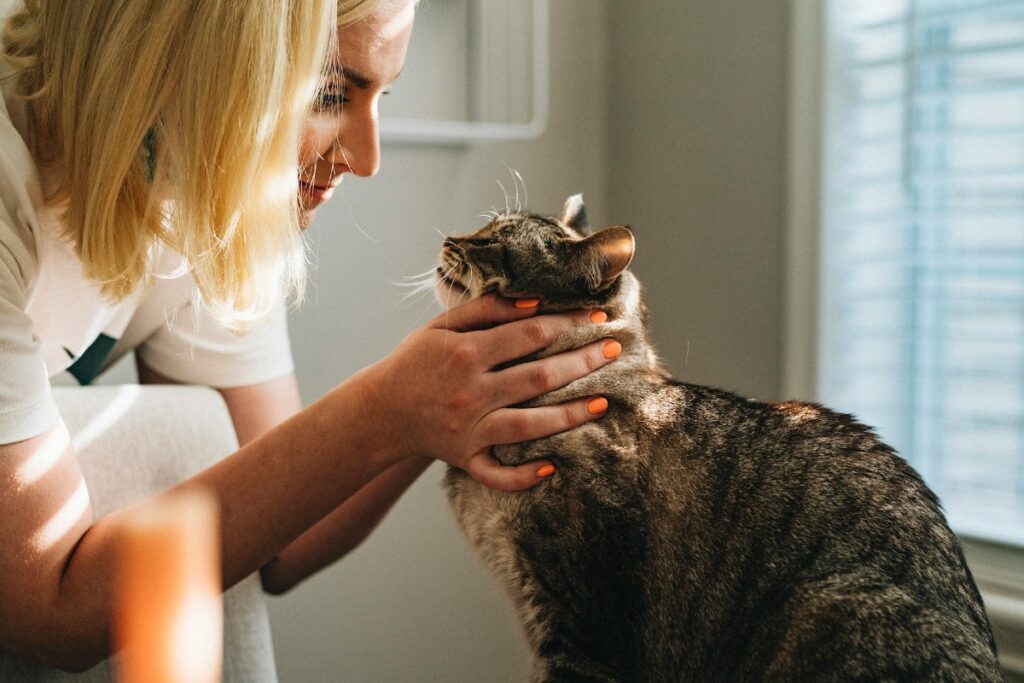
By Jack O’Toole | South Carolina’s two flagship universities could be the biggest winners in the $13 billion budget that the South Carolina Senate will consider next week. If its provisions become law, the University of South Carolina and Clemson University would get enough money to complete projects they call “transformative” – a new medical campus at USC and the state’s first veterinary school at Clemson.
In the case of USC, that means an additional $53 million for its new School of Medicine campus at the university’s Bull Street site. According to USC, the campus’s 300,000-square-foot main building, at a total cost of about $300 million, will include “innovative active-learning classrooms, extensive medical simulation spaces, a health science library, numerous labs for interdisciplinary research and a cafe.”
The university currently plans to break ground on the building in 2025 and finish construction by 2027.
“This is a tremendous investment by the legislature that will propel health-related research and education for many years to come and ultimately benefit all South Carolinians,” USC spokesman Jeff Stensland said.
For Clemson, the big prize is $175 million to launch the state’s first school of veterinary medicine, which university leaders hope to have open by the fall of 2026. School officials say the program will include “foundational courses, clinical skills, professional development, initial clinical training and clinical clerkships,” and will help alleviate the state’s growing veterinarian shortage.
“The state of South Carolina and the country is suffering from a shortage of veterinarians – both large and small animal practitioners,” College of Veterinary Medicine dean, Dr. Steven Marks, told Statehouse Report in a statement. “There will be special efforts to train veterinary clinicians to work with cows, equine, poultry and other livestock to help animal owners and our agricultural community, which is a key economic driver for our state.”
“A pretty good budget”
The Senate’s version of the 2024-25 state budget also calls for an income tax cut as well as pay raises for teachers and state employees. In addition, it seeks to invest more in roads and bridges.

The budget plan, which emerged from the Senate Finance Committee this week, builds on the budget passed by the S.C. House of Representatives last month. Differences between the House and Senate budgets will eventually have to be hashed out by a conference committee made up of members of both bodies.
“This is a very fiscally responsible budget,” longtime Finance Committee member Sen. Tom Davis, R-Beaufort, said in a Thursday interview. “It focuses on core functions of government, and when we were able to get some money back to the taxpayer, we did.”
And in remarks that reflect the bipartisan legislative approach that still largely prevails in the state Senate, Richland Democratic Sen. Darrell Jackson, also a veteran member of the Finance Committee, mostly agreed.
“Actually, this is a pretty good budget,” Jackson told Statehouse Report.
Tax cuts, pay raises, infrastructure and school meals
The major differences between the House and Senate budgets grow out of the way each treats a $600 million surplus in state sales tax collections.
In March, House budget writers rejected Gov. Henry McMaster’s proposal to put the funds toward repairing and replacing the state’s aging bridge network. Instead, they used it to fund a one-time property tax rebate with an average benefit of $330 for South Carolina homeowners.
Staking out a middle ground, the Senate budget provides $100 million in permanent income tax relief, and invests the bulk of the balance in roads, bridges and rural projects involving water and sewer infrastructure.
The Senate budget also raises teacher and state employee pay, which S.C. Education Association President Sherry East said was exciting. “With every pay raise, we get closer to the national average, which is what we would like to see to attract and retain teachers.”
And in a measure that supporters say will make a big difference in the lives of poor families across the state, the Senate budget also covers the full cost of school breakfast and lunch for all students who qualify for reduced price meals.
A ‘conversation’ about Medicaid expansion?
In 2010, a bitterly divided U.S. Congress passed the Affordable Care Act, known then and now to friend and foe as “Obamacare.” In the years since, some 40 states have taken advantage of the law’s federal subsidies to expand health care coverage to some of their poorest citizens through the Medicaid program.
But in South Carolina, where slightly more than 10% of the population is uninsured, the state’s dominant Republican Party has never seriously considered the question.
That may be about to change, however, under a Senate budget provision that authorizes the creation of a Health care Market Study Committee. The committee would be charged with studying both supply and demand issues in the Palmetto State’s health care system.
According to supporters, the committee’s goal would be to expand health care access and competition by ensuring that medical professionals are able to offer their services without undue state regulation. But as senators of both parties note, that would be pointless if people couldn’t afford the services.
“It doesn’t make any sense to increase access to health care if patients still don’t have the financial wherewithal to pay for it,” Davis, the Beaufort Republican, said. “So one of the things we’re looking at on the demand side is the possibility of expanding the Medicaid population under the Affordable Care Act.”
Not that Davis believes it will be easy, or is even certain he would wind up supporting the idea. But he does believe it’s time for South Carolina to take the question seriously.
“You know, I’m not sure where we’ll end up on it,” Davis said. “But I do think it’s important to have that conversation as part of this larger discussion about how we can improve our healthcare market.”
If enacted in the final state budget, the provision would require the committee to complete its recommendations in time for consideration next year.
- Have a comment? Send to: feedback@statehousereport.com.
Report blasts Loftis over $1.8B scandal
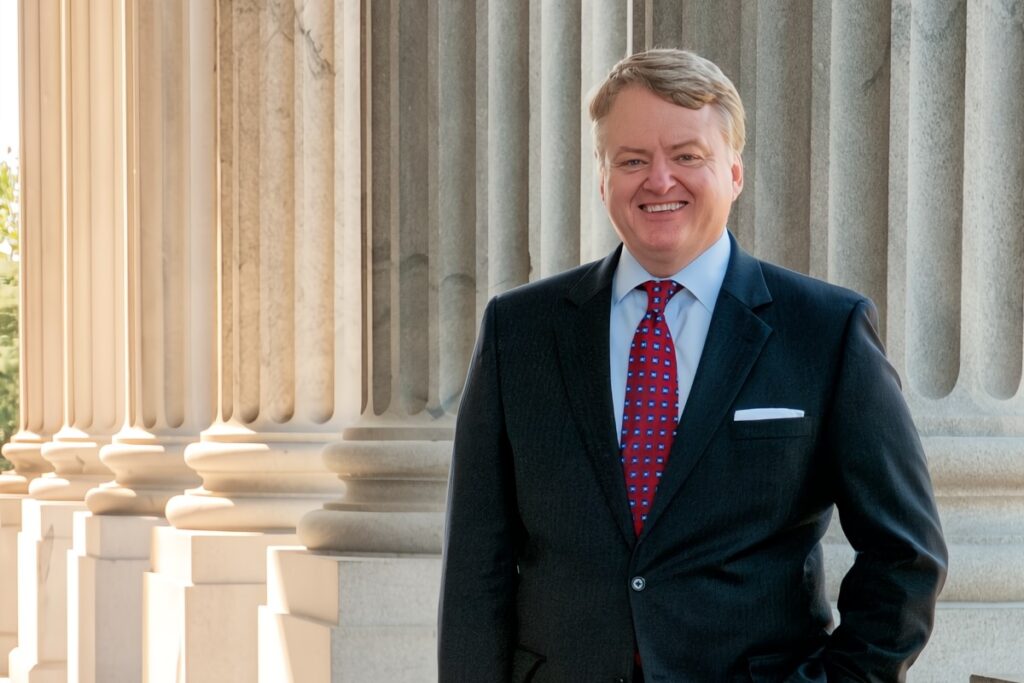
By Jack O’Toole | Voters may have something new to decide on this year’s ballot — not who their treasurer should be, but whether they should keep voting for one at all.
An explosive new interim report on Tuesday from an S.C. Senate Finance subcommittee concluded State Treasurer Curtis Loftis and his office are responsible for a $1.8 billion accounting scandal that has embarrassed state leaders. Senators said the snafu appeared to involve no criminal wrongdoing, but cast doubt on South Carolina’s ability to track its finances
Sources say the legislature, which is already considering a vote to put the future of the state comptroller general’s office on the ballot as a result of a separate $3.5 billion scandal, likely will now also ask voters to consider removing the elected treasurer’s office and make it a position appointed by the governor. Loftis has already said he does not plan to seek a fifth term.
“Treasurer Loftis has failed to maintain the integrity of the state’s banking and investment records … (and) has known about (these) unresolved differences for at least seven years,” state Sen. Larry Grooms, R-Berkeley, said Tuesday on the Senate floor.
Weeks of finger-pointing
The Senate subcommittee’s interim report comes after weeks of finger-pointing by state financial officials over an account that appears to contain $1.8 billion in unexplained and unreconciled funds. Put plainly, state accountants cannot say where the money came from or who it belongs to.
“The subcommittee concludes the state treasurer is responsible for the 1.8 billion discrepancy,” said Grooms, who chaired the subcommittee investigation.
He said while the committee discovered no evidence of criminal wrongdoing, “the possibility cannot be summarily dismissed due to the size of the errors, the length of time they were concealed, and the inaccurate condition of the treasury records.”
Meanwhile, the report’s allegations against the treasurer did not stop with the $1.8 billion error. Grooms’ Senate presentation detailed other money management problems that the subcommittee discovered.

“Research revealed that the (state) general fund was actually negative by $474 million at the close of the (2023) fiscal year,” Grooms said. “A determination was made to offset the negative balance by (using) state investments…despite positive cash balances held in banks and record receipts of revenues into the general fund.”
Doubling-down
Perhaps most surprising was an allegation that Loftis, in response to subcommittee requests for more transparency, threatened to publish highly sensitive state financial records on the internet.
According to Grooms, that threat led to an emergency meeting with the state’s attorney general and members of the staff of Gov. Henry McMaster “to find a way to stop the treasurer from publishing detailed information that would have crippled our state.”
At one point, state Attorney General Alan Wilson was even working on an emergency injunction order to present to the state Supreme Court, Grooms said. But then, a direct intervention by the governor seemed to resolve the situation.
“The governor made a direct appeal to him by telephone, asking him to please don’t do it,” he said. “The governor believed the treasurer was backing down (and) the crisis was over.”
In response to Tuesday’s report, Loftis blasted Grooms and his subcommittee colleagues, noting in a statement that senators enjoy immunity from defamation laws when speaking on the floor.
“There are no penalties for senators making false statements, and no court action available to me,” Loftis said. “I’ll not read the Senate’s report, nor will I watch the Senate proceedings, as the subcommittee’s mission is not one based on honor and integrity.”
Tuesday’s report and continuing scandal arrive on the heels of S.C. Comptroller General Richard Eckstrom’s resignation last March after he admitted to a decade-long series of errors that artificially inflated the state’s cash reserves by $3.5 billion.
Putting Humpty Dumpty back together again
Efforts to right the state’s fiscal ship are currently moving forward in two lanes.

First, McMaster convened an interdepartmental meeting of state financial officers last Thursday and charged them with getting to the bottom of the mysterious $1.8 billion by July 1, according to McMaster spokesman Brandon Charochak
“The governor believes the public’s confidence is best maintained when elected officials and agencies work together to solve problems through collaboration, cooperation and communication,” Charochak said.
And second, with an eye toward restructuring, legislators are working on bills that would bring the state’s financial management under the control of the governor, with the comptroller general, the state auditor and now probably the treasurer becoming his appointees.
“Politics really shouldn’t come into play,” Grooms told reporters on April 2, in reference to the legislation. “People prefer their accountants not be crusaders.”
In other recent headlines:
![]() Bill at S.C. House would make period products tax-exempt. A bipartisan bill advancing in the House would exempt period products from state and local sales taxes — a cost that supporters argue is only imposed on a specific group of South Carolinians and disproportionately affects many of them.
Bill at S.C. House would make period products tax-exempt. A bipartisan bill advancing in the House would exempt period products from state and local sales taxes — a cost that supporters argue is only imposed on a specific group of South Carolinians and disproportionately affects many of them.
Crabbing regulation bill sinks in Statehouse. South Carolina crabbers have succeeded in sinking a bill that would have introduced regulations on the state’s troubled blue crab fishery for the first time as officials tried to address plummeting catches over the last two decades.
S.C. senators want residents to submit ID to access certain websites. South Carolina senators are advancing legislation requiring pornographic websites to verify users’ age despite warnings from a staff attorney the bill could face First Amendment issues.
S.C. Republicans reject 2018 Democratic governor nominee’s bid to be judge. Republicans in the South Carolina General Assembly have taken the rare move of rejecting the only remaining candidate in a race to be a circuit judge.
Senate opposition leaves S.C. energy bill with listless future. Several S.C. senators spoke out against an energy proposal that supporters say will help South Carolina keep the lights on as the state rapidly grows before the bill could get debated on the Senate floor.
- Have a comment? Send to: feedback@statehousereport.com.
Springtime
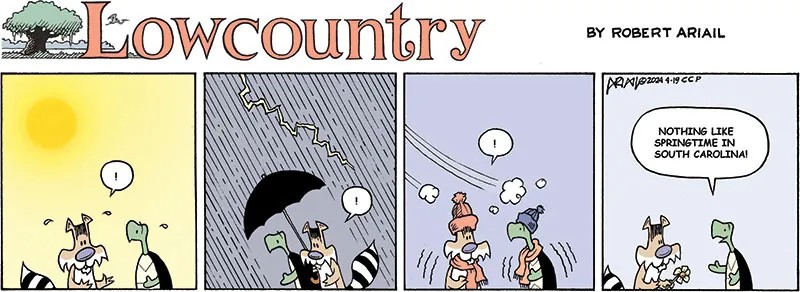
Award-winning cartoonist Robert Ariail generally has a biting or funny comment about the great state of South Carolina in his weekly cartoon. This week, he offers a twist about springtime.
- Love the cartoon? Hate it? What do you think: feedback@statehousereport.com.
The weird has turned pro in South Carolina
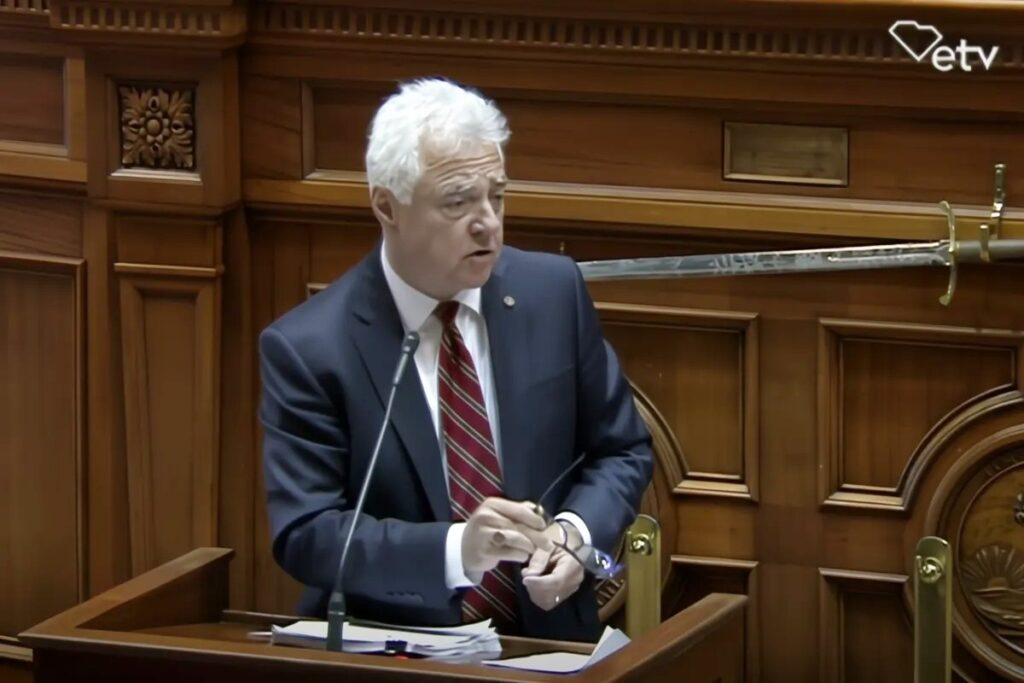
By Andy Brack | The late Gonzo journalist Hunter S. Thompson observed more than 50 years ago that “when the going gets weird, the weird turn pro.”
Now is that time in South Carolina. The weird turned pro in Columbia in a week when a Senate subcommittee report on the odd happenings of a $1.8 billion accounting error caused more fingers to be pointed than at a pop concert.
 In the hot seat is State Treasurer Curtis Loftis, who senators blame for not being able to explain or reconcile a state account with $1.8 billion in it. As Charleston City Paper reporter Jack O’Toole described earlier this week, “state accountants cannot say where the money came from or who it belongs to.”
In the hot seat is State Treasurer Curtis Loftis, who senators blame for not being able to explain or reconcile a state account with $1.8 billion in it. As Charleston City Paper reporter Jack O’Toole described earlier this week, “state accountants cannot say where the money came from or who it belongs to.”
Sheesh. Talk about a series of egg-on-face moments, particularly following last year’s abrupt resignation of S.C. Comptroller General Richard Eckstrom after admitting to a decade of errors that artificially inflated the state’s cash reserves – by $3.5 billion.
At least this new error does not appear wilful. Senators say they suspect no criminal wrongdoing. But in best CYA fashion, they note in a 116-page report, “the possibility cannot be summarily dismissed due to the size of the errors, the length of time they were concealed, and the inaccurate condition of the treasury records.”
Loftis, who has said he wouldn’t run for a fifth term (good), is having nothing much to do with the Senate and its report.
“There are no penalties for senators making false statements, and no court action available to me,” Loftis said in a statement. “I’ll not read the Senate’s report, nor will I watch the Senate proceedings, as the subcommittee’s mission is not one based on honor and integrity.”
But what may make the whole fiasco worse was an apparent threat by Loftis at one point to put highly-sensitive classified financial records online as a way to be more transparent to the committee.
Senior state officials reportedly didn’t initially take it that seriously, until all of a sudden they did, which sent them scurrying around trying to contain possible damage.
The head of the Senate subcommittee investigating the mess, Republican Larry Grooms of Berkeley County, said state Attorney General Alan Wilson and members of Gov. Henry McMaster’s staff held an emergency meeting “to find a way to stop the treasurer from publishing detailed information that would have crippled our state.”
In the end, McMaster reportedly defused the situation by phoning Loftis and talking him off the disclosure ledge.
“The governor made a direct appeal to him by telephone, asking him to please don’t do it,” Grooms told state senators this week. “The governor believed the treasurer was backing down (and) the crisis was over.”
Whew. Loftis, for his part, says his office never “lost track” of the $1.8 billion, pointing to detailed correspondence and information that’s online.
“It was part of a pool of money which the State Treasurer’s Office had always accounted for, invested and held for the state’s use,” he wrote in a clarification to Grooms on April 4.
Whatever happens next, one thing is clear: We’ve got to get rid of the weird in Columbia. The state needs smoother financial seas. Maybe the state treasurer’s job, like that of the comptroller general, doesn’t need to be an elected position any more, as outlined in the state constitution. Lawmakers need to put both positions on the November ballot to get voters’ permission to eliminate the elected positions and put them under the governor’s office.
Andy Brack is editor and publisher of Statehouse Report and the Charleston City Paper. Have a comment? Send to: feedback@statehousereport.com.
Charleston Animal Society
 We’re pleased today to shine our spotlight on the Charleston Animal Society, leader in the effort to make Charleston County a safe place for animals. Now the society is working to expand its Charleston success statewide to energize the state to reshape its 300-plus shelters and animal organizations into a no-kill network that stretches from Walhalla to Little River to Daufuskie Island.
We’re pleased today to shine our spotlight on the Charleston Animal Society, leader in the effort to make Charleston County a safe place for animals. Now the society is working to expand its Charleston success statewide to energize the state to reshape its 300-plus shelters and animal organizations into a no-kill network that stretches from Walhalla to Little River to Daufuskie Island.
Safe and healthy communities, neighborhoods and families don’t just happen – they’re built. “No Kill – No Harm – No More” shines a spotlight on animal abuse and family violence, which are often perceived and treated as separate issues. However, animal abuse is often the tip of the iceberg to larger issues in the home, such as child abuse, elder abuse or domestic violence.
- South Carolina’s most honored charity four years in a row
- National model for success
- Southeast’s only AAHA-accredited combined clinic and shelter
- Focused on solving problems rather than reacting to them year after year
- Publishes Carolina Tails, the largest pet magazine in S.C.
- No Kill. No Harm. No More. is a “movement” comprised of two major initiatives: No Kill Charleston and No Kill South Carolina.
- Learn more about the Charleston Animal Society and its work to create a network of humane network for the animals that bring joy to our lives.
Hint: It’s in Charleston
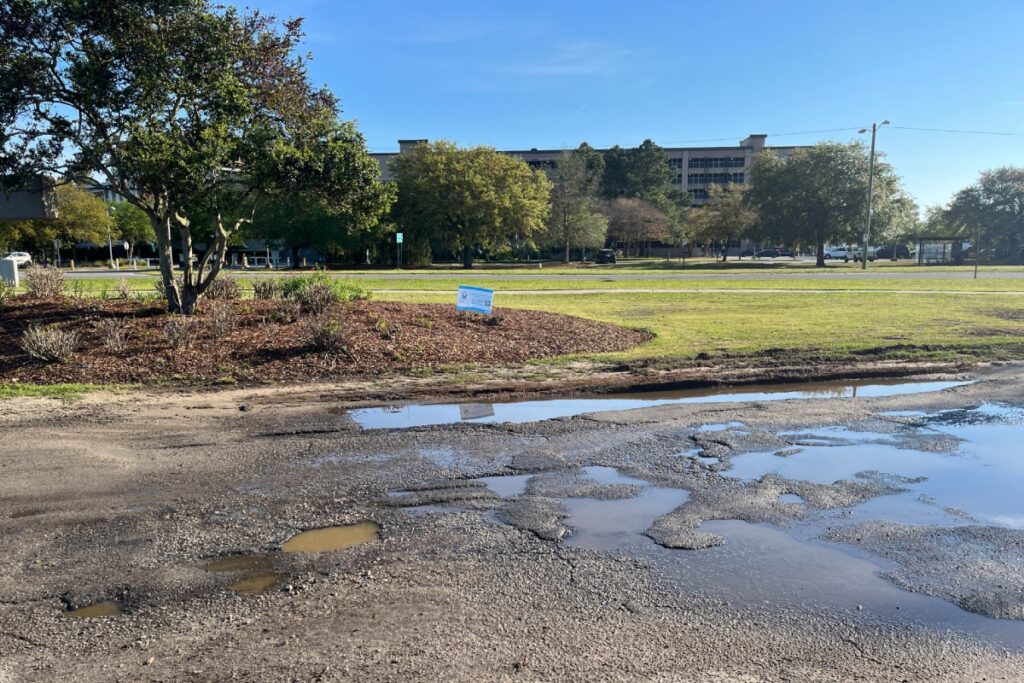
This photo is in Charleston, but where was it taken? If you’ve driven around the peninsula, there’s a great chance you might have seen it at some point. Where was this photo taken? Send your name, hometown and guess to: feedback@statehousereport.com.
 A whopping 24 people correctly answered last week’s “Somewhere over the …” from longtime Florence reader Barry Wingard. It showed a rainbow over part of the Florence Veterans Park.
A whopping 24 people correctly answered last week’s “Somewhere over the …” from longtime Florence reader Barry Wingard. It showed a rainbow over part of the Florence Veterans Park.
Noted David Lupo of Mount Pleasant: “It’s the Eagle Monument by sculptor Alex Palkovich, who was born in an area that became part of Ukraine. The three pillars, only two of which are visible in the photo, represent the Army, Navy, Marine Corps, Air Force, Coast Guard, and Merchant Marines. (It was erected before the establishment of the Space Corps.)”
More people answered this mystery photo than in many moons. Congrats to those who gave the right answer: Pam McDaniel and Jacie Godfrey, both of Florence; Allan Peel of San Antonio, Texas; Elizabeth Jones and Jay Altman of Columbia; Sheila Thompson of West Columbia; Steve Willis and Pauline Mast, both of Lancaster; Will Bradley of Las Vegas, Nevada; Tim Pressley of Lyman; Julie Greene of Fort Mill; Pat Keadle of Wagener; George Graf of Palmyra, Va.; Michael Webb and Bill Segars, both of Hartsville; Wyatt Williams of Greenville; Frank Bouknight of Summerville; Jenna Wiley of Shady Side, Maryland; Chase Ebernickle of Antreville; Michael Murphy of Lexington; Shaun Pope of Campobello; and Ralph Conklin.
- Send us a mystery picture. If you have a photo that you believe will stump readers, send it along (but make sure to tell us what it is because it may stump us too!) Send to: feedback@statehousereport.com and mark it as a photo submission. Thanks.
Send us your thoughts
We encourage you to send in your thoughts about policy and politics impacting South Carolina. We’ve gotten some letters in the last few weeks – some positive, others nasty. We print non-defamatory comments, but unless you provide your contact information – name and hometown, plus a phone number used only by us for verification – we can’t publish your thoughts.
- Have a comment? Send your letters or comments to: feedback@statehousereport.com. Make sure to provide your contact details (name, hometown and phone number for verification. Letters are limited to 150 words.
- ORDER NOW: Copies are in Lowcountry-area bookstores now, but if you can’t swing by, you can order a copy online today.
- Now available as an e-book!
ABOUT STATEHOUSE REPORT
Statehouse Report, founded in 2001 as a weekly legislative forecast that informs readers about what is going to happen in South Carolina politics and policy, is provided to you at no charge every Friday.
- Editor and publisher: Andy Brack, 843.670.3996
Donate today
We’re proud to offer Statehouse Report for free. For more than a dozen years, we’ve been the go-to place for insightful independent policy and political news and views in the Palmetto State. And we love it as much as you do.
But now, we can use your help. If you’ve been thinking of contributing to Statehouse Report over the years, now would be a great time to contribute as we deal with the crisis. In advance, thank you.
Buy the book
Now you can get a copy of editor and publisher Andy Brack’s We Can Do Better, South Carolina! ($14.99) as a paperback or as a Kindle book ($7.99). . The book of essays offers incisive commentaries by editor and publisher Andy Brack on the American South, the common good, vexing problems for the Palmetto State and interesting South Carolina leaders.
More
-
- Mailing address: Send inquiries by mail to: P.O. Box 21942, Charleston, SC 29413
- Subscriptions are free: Click to subscribe.
- We hope you’ll keep receiving the great news and information from Statehouse Report, but if you need to unsubscribe, go to the bottom of the weekly email issue and follow the instructions.
- Read our sister publication: Charleston City Paper (every Friday in print; Every day online)
- © 2024, Statehouse Report, a publication of City Paper Publishing, LLC. All rights reserved.















 We Can Do Better, South Carolina!
We Can Do Better, South Carolina!